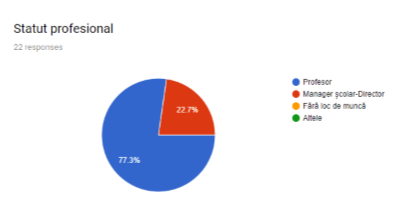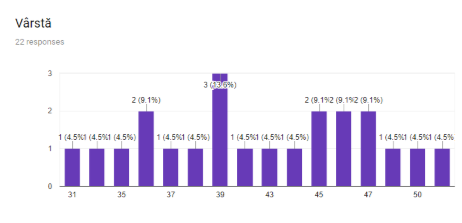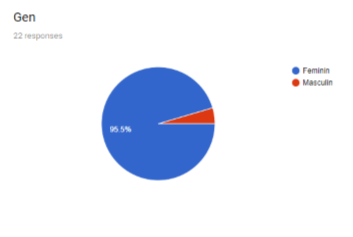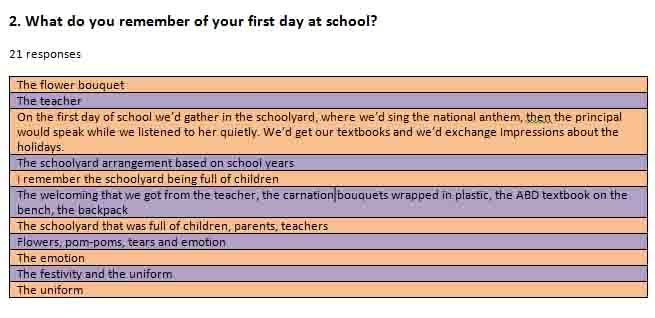Abstract
The aim of “Teachers’ Lived Experience”, a qualitative and quantitative study, is to shed light on several aspects of Romanian teachers’ lived experience over the course of approximately 30 years and to observe evolutions in educational mentalities at micro level from the perspective of the very people found at the centre of it - teachers. The subjects were interviewed about their experience and motivations as pupils during communism, the various challenges they encountered as they adapted as young adults and teachers to the transitioning period from communism to democracy and finally, about their ever pressing need to always perfect themselves as educational professionals and implement new and effective teaching methods from their standpoint as students at the Educational Management master program at the ODL Direction at the University of Bucharest during these arguably post-transitional times. All of the subjects are students of the ODL Department and had been working as teachers for most of their career. The end results of this study will take on a multimedia form that will be accessible to the students of the ODL Direction at the University of Bucharest.
Keywords: Teacherslived experiencecommunismtransitional periodpost-transitionadult education
Introduction
Europe has seen its fair share of social turmoil no more than 30 years ago with the fall of communism in Eastern Europe - a major event which also featured the subsequent and lengthy adaptation to a market economy. The aim of this paper and of our qualitative and quantitative study entitled “Teachers’ Lived Experience” is to explore teachers’ memories and experience aspects related to school life in communism and to investigate how in the aftermath of the 1989 Romanian Revolution (which brought down the communist regime in Romania) social and historical events intermingled with their profession. At the same time, the respondents that participated in the study by completing the questionnaire are students of the ODL Direction at the University of Bucharest and it became obvious that the study should also be used as a means of acquiring feedback from them in terms of the quality of the educational services that the Direction offers.
Problem Statement
Nowadays there is a lot of focus on how to improve the national educational system and regarding how to better implement European educational practices if possible at all, but much like in any policy type of thinking, there is very little attention paid to who the people are who form children, at micro-level. There are reports and statistics (National Institute of Statisics of Romania, 2016; European Commission, 2017) that shed light on the national educational system but they are just figures that aid policy makers. Teachers are seen as major pillars of society, a responsibility that comes with much pressure and the obligation to rapidly adapt to changes made in the curriculum or other school related activities whether they are truly able or not.
The ODL Direction at the University of Bucharest and the Educational Management Part-time master in particular, primarily prepares students that are teaching professionals - be them kindergarten, primary school, middle school or high school teachers - and as such we have access to their expertise and willingness for cooperation.
At the same time, it should be mentioned that around half of the students enrolled in this master’s program are usually over the age of 35 and have been teachers since their 20s which, in turn, implies that they have significant teaching experience and life experience and have seen social events in Romania from a comprehensive vantage point. In fact, the older they are, the more critical that vantage point becomes.
Lastly, it should be noted that this type of teachers’ memory retrieval exercise has been the focus of many studies (Chang-Kredl & Kingsley, 2014; Beals et al., 2013; Gardner, 2003; Ovens & Tinning, 2009) with some focusing on ideological changes (Ferreira & Mota, 2013).
Research Questions
The main questions that formed the premise of this study was related to our work in helping and counselling these students and these were: Who are our students right now?
How do they perceive their profession?
How did historical events in Romania shape their perception on the teaching profession?
Is the ODL Direction truly fulfilling their formative wishes and requirements?
Purpose of the Study
The main purpose of this research is to identify the evolution of the teaching profession, throughout all of the stages of social life, focusing on relevant events in the recent history of Romania: communism, The 1989 Revolution, the transition, EU entry and post-transition. In a larger sense we wish to create a memory archive of the teacher’s lived experience throughout time. A second perspective follows the respondents’ student status at the Educational Management part-time master program that the ODL Direction of the University of Bucharest offers and the impact that this endeavour has on their professional future.
However, a more ambitious scope of the study would be to recreate mentalities of the past and the formation of mentalities today and perhaps to pin point a clash between them if possible.
The end results of this study will take on a multimedia form that will be accessible to the students of the ODL Direction at the University of Bucharest.
Research Methods
The research methods employed in the conduction of this study consisted of a Google Forms questionnaire aimed at establishing the subjects’ basic information as well as their overall evolution across their personal and professional lives. The main sections of the questionnaire are the following:
1.TLEXP – Project Teachers’ lived experience – which features a description of the project and establishes basic information about our student subjects
2.Communism and the 1989 Revolution – designed to be filled by respondents over the age of 35 and surveys the childhood and young adult (in some cases) memories of the respondents.
3.After 1989 and the Transition (1989 - 2007) – designed to be filled by respondents under the age of 35 and surveys their childhood memories.
4.The Transition (1989 - 2007) – aimed at establishing the personal and professional evolution of the respondents over the age of 35.
5.Post – Transition – Aimed at investigating the manner in which our respondents understood events related to Romania’s entry into the European Union.
6.The experience as a student at the Part Time Educational Management Master Program – which was thought of as both a means of quality evaluation as well as a way through which the personal and professional evolution of the respondents that undertook this master program could be observed.
Findings
One of the first questions in the first section of the questionnaire – “TLEXP – Project Teachers’ lived experience” - dealt with the B.A studies that our students had undertaken prior to enrolling at the Educational Management part-time master’s degree. While 13 of the respondents had a background in Pedagogy and Psychology and even one in Management, 3 had graduated Mathematics, 2 had graduated History, 2 had graduated Letters, 1 had graduated Sacred Art and 1 had graduated Physical Education.
As for a comprehensive profile on the respondents; 21 of them were female with only 1 male (Figure




The majority of the respondents went to primary school in a rural area (12 respondents) with the rest attending classes in an urban area of the country and the majority of the respondents claimed that they no longer have their residence in the place where they finished school (15 respondents).
It seems that the majority of the respondents did not have a teacher in their extended family that could have served as an early role model for their career (16 out of 22 respondents).
The next segments in the questionnaire are entitled “Communism and the 1989 Revolution” – directed at respondents over the age of 35 years old, “After 1989 and the Transition” – directed at respondents under the age of 35 and “The Transition (1989 - 2007)” which interrogate aspects of social life during those particular historical periods and as such, they have to be read together.
The 1989 Revolution in Romania was a time of intense social turmoil and violence as noted by the respondents that were in Bucharest at the time who mention shots being fired, the agitation, fear and desperation as one respondent testifies that her mother was desperate because they could not find her brother anywhere. There is a significant difference between the memories of the event as perceived by the inhabitants of Bucharest and those that were in other cities at the time with the latter group claiming no particular impressive memory. It is also revealed in the previous question that the latter group of respondents said that they at the countryside because the winter holiday had just begun.
In trying to recreate the atmosphere of a communist classroom, the next question interrogates respondent memories about their first day of school (Figure
Another question dealt with the figure of the primary school teacher and 18 of the respondents described him/her by using qualities while only 4 respondents described him/her as being exigent with some even mentioning that they resorted to corporal punishments in order to maintain discipline (nowadays such actions against students are forbidden in schools).
Also, when asked about the overall opinion on school in communism the majority of the respondents listed discipline as the main attribute of school life then. The remainder of 3 respondents condemned the lack of didactical material, qualified teachers and heating in the classrooms, along with daily stress. One respondent did not recall anything from that time.
Daily home life in communism for our students during their youth was also an important issue that was necessary to investigate with emphasis on how they spent their free time. Out of the 22 respondents, 14 recalled playing outside with their friends as their main activity. Other ways of spending their free time included reading, watching television, listening to music or helping their parents around the house.
Knowing full well that there were severe restrictions on television programmes broadcasting, it appears that most of those interviewed (14 respondents) had regularly watched cartoons for the small amount of time that they were on or when they could catch Bulgarian television transmissions. They also mentioned a documentary series called Teleenciclopedia and films. The rest of the respondents said that they did not watch television.
As far as experiences go, we were particularly interested in the pleasant memories related to school life or college life that the respondents had from that time. It appears that while some first thought about their favourite classes or extracurricular activities and even banquets, others considered that the time they spent with their classmates either during breaks, outside school hours or while skipping classes were their best memories. Then there were those who recalled the satisfaction of their college years or graduation. Most notably, there were 2 respondents that were fond of the moments when they were named a pioneer commandant.
It cannot be argued that the previous question refers to their social life, but it was also important to know how they related to their teacher as an authority figure and if they were impressed at some point by the figure of one of them. The majority (19 respondents) claimed that they were in fact, impressed by the figure of one teacher with only 3 saying that they were not. Again, it appears that for this particular question the respondents opted for a “yes or no” type of answer, with only 4 respondents actually elaborating on the subject.
Adapting to the transition from communism to capitalism was the key focus of the next section and here the opinions are divided with 11 respondents affirming a smooth and good transition while 7 others insisted on the negative aspects or the issues that they encountered such as continuous changes in educational policies and the inability to truly understand most of those changes. The other 4 respondents could not evaluate this effect.
The next segment explores the changes in the respondents’ professional lives in an arguably post-transitional setting marked by the entrance of Romania in the European Union and it is entitled “Post – Transition”.
Romania joined the (European Union) E.U. in 2007, along with Bulgaria, which came with many changes in national policies especially those concerning education. When asked what this particular historical event meant for them, 9 of the respondents saw it as unimportant or even a source of national decline. At the same time, the other 13 has a more positive view on this event with 10 of the respondents hailing the hope, progress, national openness and school reforms, while the other 3 mentioned the fact that it became easier to travel abroad.
Moreover, it felt necessary to know if the respondents were recalling that blatant changes in education at micro level subsequent to the fall of communism after the 1989 Revolution. The opinions expressed in this case vary immensely. While some note a sudden departure from the previous system such as the fact that the portrait of Nicolae Ceausescu along with the Romanian flag was removed from the classroom or that there was a sudden shift in the teachers’ attitude who readily went from communist militants to an apologetic stance for all of the excesses they had engaged in prior to the revolution, others noted the generalized chaos that followed in the educational institutions. One respondent noted that some aspects changed fast such as the elimination of agricultural workshops held for pre-high school students and many respondents appreciated the liberalisation of the educational system. At the same time, others did not think the same as one respondent puts it: „The needs of children have changed, but not the approach” and a second respondent insisted that there are no major changes as people do not change.
It became relevant to see if the aforementioned changes had impacted their career path choice in any way. The majority of the respondents answered in a very simple “yes or no” manner with only two respondents actually feeling the need to further elaborate on those motivations. A good portion of the respondents (15) figured that these social and political changes did not affect their career path decisions in any way.
The future for education professionals appears to be riddled with optimism as it would seem to transpire from the overall opinion of the respondents when asked if they would encourage their own children or their classroom students to choose a teaching career path. 13 respondents out of 22 said that they would encourage their children to become teachers because, while they pay is not substantial, the activity itself offers intense moral satisfaction and some of the respondents hail it as a line of work that is only appropriate for young people who have a calling for it. The other 9 respondents, on the other hand, see teaching as a career path that should not be encouraged at the moment due to it not being as respected as it used to be, being underpaid and the general conflicts encountered when interacting both with students and their parents.
The last segment’s questions (“The experience as a student at the Part Time Educational Management Master Program”) deal with the students’ motivation for enrolling at the Educational Management part-time master study program and the majority declared that their main reason for attending it was either for professional or for personal development. While it is a known fact that the majority of people who enrol in this type of program can occupy a school manager position upon studies’ completion, only 2 of the respondents directly claimed so.
It was also essential for this study to enquire if the master students had incorporated into their daily professional life what they had learned in the tutorial activities. An overwhelming majority of 20 claimed that they had done so with some even exemplifying - even though it was not necessary at this point in the form - that they had used ICT tools in the classroom or other forms of information technology when envisioning European project proposals or methodical activities.
The next question asked about how they concretely integrated information received during the tutorial activities. The answers represent a reiteration of the situations exemplified in the previous form item with emphasis on the fact that 18 respondents described the concrete situations where they integrated knowledge received during the master’s courses into their professional lives.
It also seems that the students are optimistic and confident about their professional futures as the answers to the last question in the questionnaire suggests. The majority believed that their future will be a successful one, that they will eventually occupy a school/kindergarten manager position and that they will innovate their place of employment. Still, there are 5 respondents that do not see themselves advancing professionally in any way and 2 respondents that claim that they do not know what the future holds for them.
Conclusion
As it can be seen from a small portion of our findings reproduced here, it becomes clear that Romania has an eclectic teaching group - a portion that were formed in times of communism, if not professionally then as children and a portion that was formed as children during the transition and became professionals sometime after the entry of Romania in the E.U. and these are the type of differences in teaching approaches and mentalities that should be perhaps taken into consideration when envisioning efficient educational policies.
Furthermore, it is obvious that their profession forces them to constantly seek improvement and other forms of adult education related to their profession’s requirements which has a very obvious downfall: while the students at the ODL Direction actively and constantly pursue means of further education, it appears that, in some cases (not many, but still relevant), their concrete motivation is not quite clear or elaborated – which is also why their answers are so similar. In fact, some appear to see a bleak future for themselves as teachers and would not encourage others to take up the profession.
It should also be noted that some have stated that the often and sudden changes in educational policies are implemented many a times without them understanding them fully, rather they have to mimic that understanding and hope for the best.
Lastly, it is also important to mention that there were only two respondents under the age of 35, although almost half of the students at the ODL Direction Educational Management Part-time master program fall under this age group, which points to a reluctance of these younger teachers to express opinions in general..
Acknowledgments
This paper could not have been possible without the contribution of our students in terms of filling out a questionnaire which, at times, had questions that referred to traumatic experiences, specifically the ones encountered by those who found themselves in Bucharest during the 1989 Revolution and for not shying away from answering uncomfortable questions.
References
- Beals, F. M., Braddock, C., Dye, A., McDonald, J., Milligan, A. & Strafford, E. (2013). The Embodied Experiences of Emerging Teachers: Exploring the Potential of Collective Biographical Memory Work. Cultural Studies/Critical Methodologies, 13(5), 419-426.
- Chang-Kredl, S. & Kingsley, S.. (2014). Identity expectations in early childhood teacher education: Pre-service teachers' memories of prior experiences and reasons for entry into the profession. Teaching & Teacher Education, 43, 27-36.
- European Commission. (2017). Education and Training Monitor 2017 Romania. Retrieved from https://ec.europa.eu/education/sites/education/files/monitor2017-ro_ro.pdf
- Ferreira, A. G. & Mota, L.. (2013). Memories of life experiences in a teacher training institution during the revolution. Paedagogica Historica, 49(5), 698-715.
- Gardner, P. (2003). Oral history in education: teacher's memory and teachers' history. History of Education, 32(2), 175-188.
- National Institute of Statisics of Romania. (2016). The Educational System in Romania – synthetic data. School/Academic year 2014 – 2015. Retrieved from http://www.insse.ro/old/sites/default/files/field/publicatii/sistemul_educational_in_romania_2014_2015.pdf
- Ovens, A. & Tinning, R. (2009). Reflection as situated practice: A memory-work study of lived experience in teacher education. Teaching & Teacher Education, 25(8), 1125-1131.
Copyright information

This work is licensed under a Creative Commons Attribution-NonCommercial-NoDerivatives 4.0 International License.
About this article
Publication Date
15 August 2019
Article Doi
eBook ISBN
978-1-80296-066-2
Publisher
Future Academy
Volume
67
Print ISBN (optional)
-
Edition Number
1st Edition
Pages
1-2235
Subjects
Educational strategies,teacher education, educational policy, organization of education, management of education, teacher training
Cite this article as:
Almăşan, B., & Nicolae*, D. (2019). From Pupils To Teachers To Students. Project “Teachers’ Lived Experience” Presentation. In E. Soare, & C. Langa (Eds.), Education Facing Contemporary World Issues, vol 67. European Proceedings of Social and Behavioural Sciences (pp. 615-623). Future Academy. https://doi.org/10.15405/epsbs.2019.08.03.73
